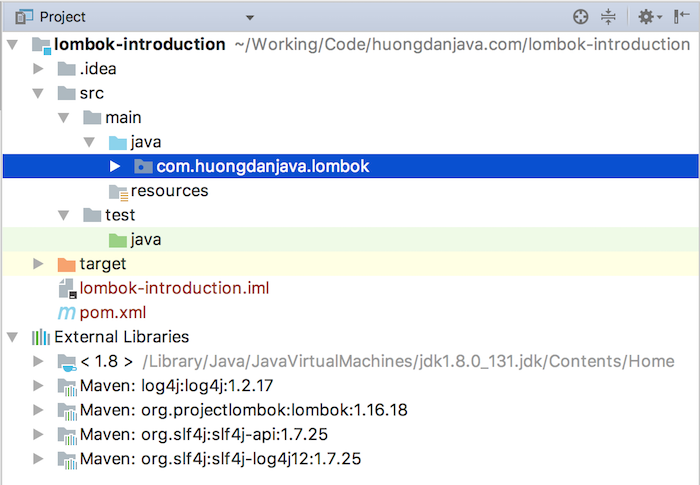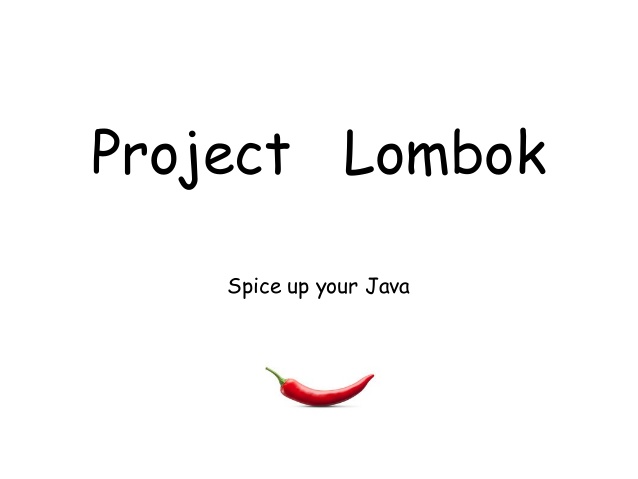Hỏi thật nhé: bạn có thấy nhàm chán khi mỗi lần cần sử dụng các phương thức Getter, Setter, toString(), equals() hay hashCode() thì lại phải đi khai báo từng phương thức như thế? Sử dụng annotation @Data của Project Lombok sẽ giúp bạn tránh khỏi cảm giác này.
First of all, mình sẽ tạo một Maven project để làm ví dụ:

Với Project Lombok dependency như sau:
|
1 2 3 4 5 6 |
<dependency> <groupId>org.projectlombok</groupId> <artifactId>lombok</artifactId> <version>1.18.24</version> <scope>provided</scope> </dependency> |
Các bạn hãy nhớ rằng, để IDE có thể hiểu được chúng ta đang sử dụng Project Lombok và không báo lỗi khi chúng ta sử dụng các phương thức mà Project Lombok sẽ generate, chúng ta cần cài đặt Project Lombok plugin vào IDE của chúng ta. Xem hướng dẫn cho IntelliJ IDE ở đây.
Bây giờ, ví dụ, mình có một Student class với một số thông tin như firstName, middleName, lastName và country. Nếu không sử dụng Project Lombok, mình phải khai báo các phương thức Getter, Setter, toString(), equals() hay hashCode() như sau:
|
1 2 3 4 5 6 7 8 9 10 11 12 13 14 15 16 17 18 19 20 21 22 23 24 25 26 27 28 29 30 31 32 33 34 35 36 37 38 39 40 41 42 43 44 45 46 47 48 49 50 51 52 53 54 55 56 57 58 59 60 61 62 63 64 65 66 67 68 69 70 71 72 73 |
package com.huongdanjava.lombok; public class Student { private String firstName; private String middleName; private String lastName; private String country; public String getFirstName() { return firstName; } public void setFirstName(String firstName) { this.firstName = firstName; } public String getMiddleName() { return middleName; } public void setMiddleName(String middleName) { this.middleName = middleName; } public String getLastName() { return lastName; } public void setLastName(String lastName) { this.lastName = lastName; } public String getCountry() { return country; } public void setCountry(String country) { this.country = country; } @Override public boolean equals(Object o) { if (this == o) return true; if (o == null || getClass() != o.getClass()) return false; Student student = (Student) o; if (!firstName.equals(student.firstName)) return false; if (!middleName.equals(student.middleName)) return false; if (!lastName.equals(student.lastName)) return false; return country.equals(student.country); } @Override public int hashCode() { int result = firstName.hashCode(); result = 31 * result + middleName.hashCode(); result = 31 * result + lastName.hashCode(); result = 31 * result + country.hashCode(); return result; } @Override public String toString() { return "Student{" + "firstName='" + firstName + '\'' + ", middleName='" + middleName + '\'' + ", lastName='" + lastName + '\'' + ", country='" + country + '\'' + '}'; } } |
Với Project Lombok, chúng ta có thể loại bỏ hết tất cả các phương thức trên và chỉ cần sử dụng annotation @Data của nó:
|
1 2 3 4 5 6 7 8 9 10 11 12 13 |
package com.huongdanjava.lombok; import lombok.Data; @Data public class Student { private String firstName; private String middleName; private String lastName; private String country; } |
Quá đơn giản và rõ ràng phải không các bạn?
Nếu các bạn kiểm tra tập tin Student.class trong thư mục /target/classes/com/huongdanjava/lombok, các bạn sẽ thấy nội dung của nó như sau:
|
1 2 3 4 5 6 7 8 9 10 11 12 13 14 15 16 17 18 19 20 21 22 23 24 25 26 27 28 29 30 31 32 33 34 35 36 37 38 39 40 41 42 43 44 45 46 47 48 49 50 51 52 53 54 55 56 57 58 59 60 61 62 63 64 65 66 67 68 69 70 71 72 73 74 75 76 77 78 79 80 81 82 83 84 85 86 87 88 89 90 91 92 93 94 95 96 97 98 99 100 101 102 103 104 105 106 107 108 109 110 111 112 113 114 115 116 117 118 119 120 121 122 123 124 125 126 127 128 129 |
// // Source code recreated from a .class file by IntelliJ IDEA // (powered by Fernflower decompiler) // package com.huongdanjava.lombok; public class Student { private String firstName; private String middleName; private String lastName; private String country; public Student() { } public String getFirstName() { return this.firstName; } public String getMiddleName() { return this.middleName; } public String getLastName() { return this.lastName; } public String getCountry() { return this.country; } public void setFirstName(String firstName) { this.firstName = firstName; } public void setMiddleName(String middleName) { this.middleName = middleName; } public void setLastName(String lastName) { this.lastName = lastName; } public void setCountry(String country) { this.country = country; } public boolean equals(Object o) { if(o == this) { return true; } else if(!(o instanceof Student)) { return false; } else { Student other = (Student)o; if(!other.canEqual(this)) { return false; } else { label59: { Object this$firstName = this.getFirstName(); Object other$firstName = other.getFirstName(); if(this$firstName == null) { if(other$firstName == null) { break label59; } } else if(this$firstName.equals(other$firstName)) { break label59; } return false; } Object this$middleName = this.getMiddleName(); Object other$middleName = other.getMiddleName(); if(this$middleName == null) { if(other$middleName != null) { return false; } } else if(!this$middleName.equals(other$middleName)) { return false; } Object this$lastName = this.getLastName(); Object other$lastName = other.getLastName(); if(this$lastName == null) { if(other$lastName != null) { return false; } } else if(!this$lastName.equals(other$lastName)) { return false; } Object this$country = this.getCountry(); Object other$country = other.getCountry(); if(this$country == null) { if(other$country != null) { return false; } } else if(!this$country.equals(other$country)) { return false; } return true; } } } protected boolean canEqual(Object other) { return other instanceof Student; } public int hashCode() { int PRIME = true; int result = 1; Object $firstName = this.getFirstName(); int result = result * 59 + ($firstName == null?43:$firstName.hashCode()); Object $middleName = this.getMiddleName(); result = result * 59 + ($middleName == null?43:$middleName.hashCode()); Object $lastName = this.getLastName(); result = result * 59 + ($lastName == null?43:$lastName.hashCode()); Object $country = this.getCountry(); result = result * 59 + ($country == null?43:$country.hashCode()); return result; } public String toString() { return "Student(firstName=" + this.getFirstName() + ", middleName=" + this.getMiddleName() + ", lastName=" + this.getLastName() + ", country=" + this.getCountry() + ")"; } } |



Trần Đạt
Em đang muốn sử dụng @Data mà không hiểu sao e đã thêm thư viện vào rồi mà không sử dụng dụng được các method get set được ạ
Khanh Nguyen
Bạn đang dùng IDE nào? Cần cài plugin để IDE generate code bạn nhé!